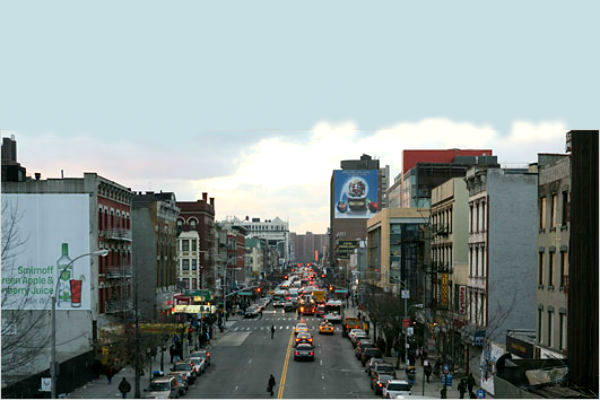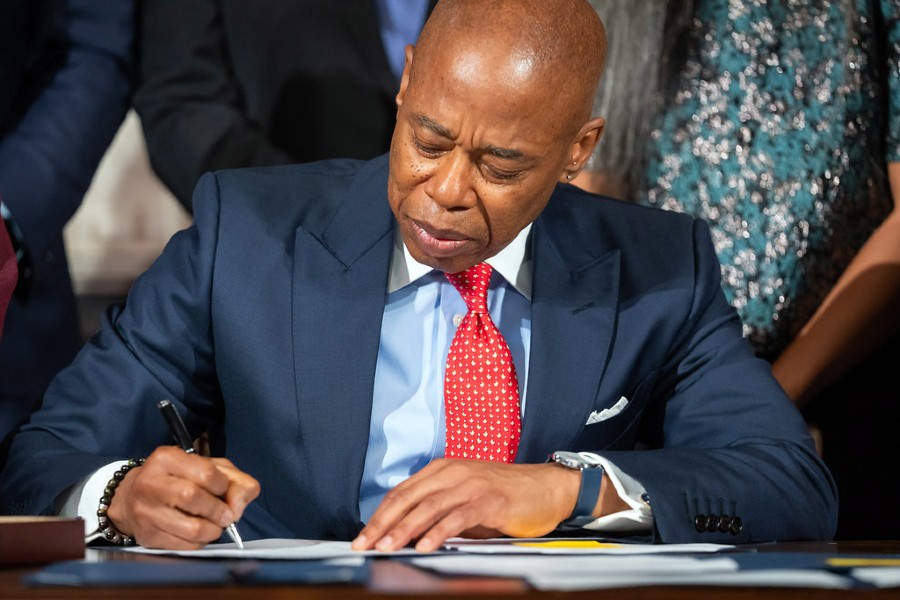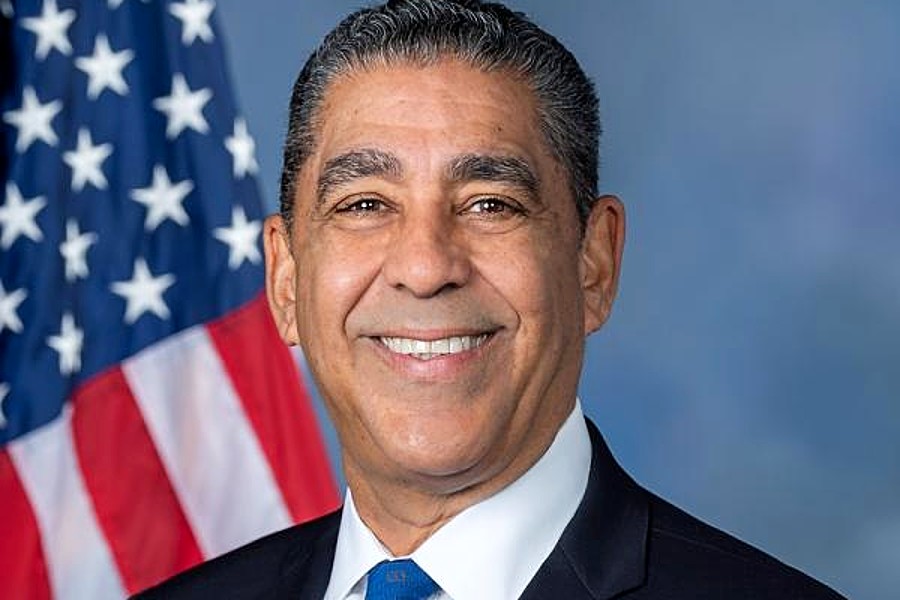 New York City Mayor Eric Adams today took action to bolster New York City’s COVID-19 preparedness and prepare New Yorkers for any future waves. Mayor Adams, the NYC Test & Trace Corps (Test & Trace), the New York City Department of Health and Mental Hygiene (DOHMH), and the New York City Department of Citywide Administrative Services (DCAS) announced the distribution of an additional 16.5 million at-home COVID-19 tests and 1 million high-quality masks that will take place over the next month to 1,600 New York City public schools and the over 1,000 community organizations, libraries, cultural institutions, houses of worship, and elected offices participating in the city’s At-Home Test Distribution Program.
New York City Mayor Eric Adams today took action to bolster New York City’s COVID-19 preparedness and prepare New Yorkers for any future waves. Mayor Adams, the NYC Test & Trace Corps (Test & Trace), the New York City Department of Health and Mental Hygiene (DOHMH), and the New York City Department of Citywide Administrative Services (DCAS) announced the distribution of an additional 16.5 million at-home COVID-19 tests and 1 million high-quality masks that will take place over the next month to 1,600 New York City public schools and the over 1,000 community organizations, libraries, cultural institutions, houses of worship, and elected offices participating in the city’s At-Home Test Distribution Program.
The distribution effort joins other measures to blunt the worst impacts of the current wave, including the distribution of 35,000 COVID-19 courses of treatment to date, which have prevented nearly 2,000 hospitalizations in the city so far.
The city has also distributed 20 million at-home tests to schools and participating community organizations to date — meaning this additional surge of tests will bring the total distributed at-home tests to over 36 million as the city prepares to potentially hit a high-alert level in the coming days — ensuring free at-home testing is widely accessible to New Yorkers across the five boroughs.
Additionally, eligible New Yorkers are encouraged to take advantage of free, at-home delivery of COVID-19 treatments.
“It’s never been easier for New Yorkers to get a free at-home test, a high-quality mask, or access COVID-19 treatments in New York City,” said Mayor Adams. “At-home tests and masks provide reliable and convenient ways for New Yorkers to confidently and safely protect themselves and others and allow them to enjoy our city. I encourage all New Yorkers to go out and pick up a free at-home test as soon as they can to remain prepared, to mask up in indoor public settings, and to take advantage of the life-saving treatments we now have readily available to fight this virus. These combined tools not only are a blessing that we previously did not have access to, but also will allow us to combat this disease in the future, instead of in the past.”
“We now have the ability to test ourselves in the comfort of our own home, before deciding whether to dine out with friends, head out for work, or attend a family gathering with grandparents and little ones,” said Deputy Mayor for Health and Human Services Anne Williams-Isom. “Along with getting vaccinated and boosted, high-quality masks and at-home tests provide additional tools to stay safe and healthy. Thank you to all the community-based organizations and faith-based institutions working to get at home tests and masks in the hands of every New Yorker that needs them.”
“Regular home testing and wearing masks indoors, especially while cases rise, is the best way to keep yourself, those around you, and your community safe,” said DOHMH Commissioner Dr. Ashwin Vasan. “I advise all New Yorkers to mask up indoors, even if you have a negative test and especially if you are unvaccinated, have not had your booster, or are in a high-risk category. Masks offer strong protection against getting and transmitting COVID-19. We don’t anticipate that this wave will last much longer, so hang in there, New York City. If we all do our part, we can bring case numbers down in the coming weeks and get ready for a wonderful summer.”
“If you test positive for COVID-19, get treatment right away — it might help you stay out of the hospital,” said NYC Health + Hospitals President and CEO Dr. Mitchell Katz. “You can call 212-COVID19 to talk to one of our medical providers and get treatment delivered right to your door. If you need to go to the hospital, our facilities are always open no matter your immigration status, ability to pay, or how long you have lived in New York City.”
“We are firmly committed to making testing resources and life-saving COVID treatments available to all New Yorkers, without exception,” said Dr. Ted Long, executive director, NYC Test & Trace Corps; and senior vice president for Ambulatory Care and Population Health, NYC Health + Hospitals. “As a primary care doctor, I know that for every 18 New Yorkers we treat, we can prevent one New Yorker from getting so sick they need to be admitted to the hospital. This variant is more contagious, but our treatments are extremely effective and have already prevented nearly 2,000 hospitalizations. These new therapeutics are the tool we’ve been waiting for to help us win the war against COVID, and they are just a phone call away.”
New York City is preparing to potentially enter a high COVID-19 alert level in the coming days and strongly recommends that all New Yorkers mask up in public indoor settings to protect themselves and others.
Through widely available tools — including at-home tests, COVID-19 treatments, masks, vaccinations, and boosters — New Yorkers have more tools at their fingertips than ever before to stay safe and healthy.
Through community partnerships alone, Test & Trace has distributed 2.3 million tests and currently maintains a stockpile of tens of millions of tests that can be rapidly distributed if needed.
Making at-home testing widely available has ensured New Yorkers can test themselves immediately if they have symptoms, so they can safely head to work, to school, or to other gatherings with family and friends, or quickly receive treatment if needed.
At-home test distribution through Test & Trace’s network of 192 prominent cultural sites and library branches brings critical self-testing resources to areas of need at familiar locations in all five boroughs.
Test & Trace makes weekly deliveries of at-home tests to participating cultural sites and libraries, where they are distributed on a first-come, first-served basis.
Additionally, over 850 community and faith-based organizations — including 243 houses of worship — have signed up to regularly distribute at-home tests.
Any New York City-based community organization that would like to participate as an at-home test distribution partner is encouraged to sign up online.
New Yorkers can find an at-home test distribution pick-up location most convenient to them and their hours of operation by visiting the city’s COVID-19 testing page: nyc.gov/covidtest.
New Yorkers with a disability who need assistance or have questions regarding at-home test kits should call 311.
Those who are deaf or hard of hearing and use American Sign Language can call via video phone at 646-396-5830.
New Yorkers who test positive using an at-home test can call 212-COVID19 to be connected to resources like free meal and care package delivery.
Care packages contain personal protection equipment (PPE) for a household of three to quarantine, two rapid antigen at-home tests, and other necessities to help New Yorkers safely isolate.
Multiple COVID-19 treatments are available for people ages 12 and older, and can be delivered to New Yorkers’ homes for free.
For more information on COVID-19 treatments, please call 212-COVID19 and press 9 or visit nyc.gov/health/covidtreatments.
Calling 212-COVID19 provides New Yorkers an immediate connection to a clinician who can refer them to monoclonal antibody treatment or prescribe antiviral medications, like Paxlovid, and arrange to have it delivered to their home that same day for free.
DOHMH will, today, also put out a Health Advisory that urges all residents to use high-quality masks — such as KN95 and KF94 masks and N95 respirators — when indoors and in a public setting, including at grocery stores, building lobbies, offices, stores, and other common or shared spaces where individuals may interact, such as restrooms, hallways, elevators, and meeting rooms.
The advisory notes particular importance for people who are at high risk of severe illness and death, namely those who are over 65 or who are unvaccinated.
DOHMH advises people at high risk of severe illness due to an underlying medical condition, older adults and people who are unvaccinated, including children under the age of five who are not yet eligible for the COVID-19 vaccine, to avoid crowded settings and non-essential gatherings, particularly indoors.
In addition, the DOHMH advisory notes that the impact of COVID-19 transmission is higher in settings with a high number of unvaccinated people.
Become a Harlem Insider!
By submitting this form, you are consenting to receive marketing emails from: . You can revoke your consent to receive emails at any time by using the SafeUnsubscribe® link, found at the bottom of every email. Emails are serviced by Constant Contact








